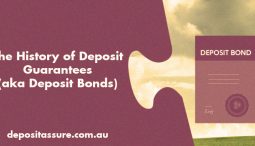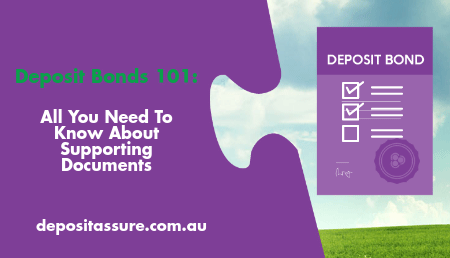How to get a deposit bond for your off the plan purchase

Need to secure your off-the-plan purchase but don’t have access to a cash deposit? Our quick how-to guide for deposit bonds could be the stress-free solution you’re looking for.
Whether you’re a first time buyer or a seasoned property investor, buying an off the plan property can be a minefield. You need to research the market, work out the current value and growth potential, and weigh up the lifestyle benefits.
The planning doesn’t stop there. You need to research the developer and get an idea of what projects they have previously completed so you can find out the quality of workmanship and ability to deliver the project.
And then, when you’ve finally selected the right off-the-plan property, the developer asks for the one thing that will secure your purchase: a deposit.
Now you are faced with a whole new challenge:
How will you pay the 10% cash deposit?
What if you don’t have access to the 10% deposit now? Or perhaps you do have the cash, but don’t want to lose out on its benefits?
The fact is, if you pay a cash deposit, it will be sitting in a term deposit gaining interest for your developer. Meanwhile, you lose access to your cash, as well as the interest and benefits, for a long period of time.
However, what many off-the-plan purchasers don’t realise is that a deposit bond could be used in place of a cash deposit to secure your purchase.
The good news is that it’s easier than you might think to get a deposit bond for your off-the-plan purchase, as this HOW TO GUIDE will show.
Keep reading to learn everything you need to know so you can make an informed decision about whether a deposit bond could be what you need to secure your off-the-plan property.
Step 1. Know what a deposit bond is.
A deposit bond is a substitute for the cash deposit that is required between signing the contract of sale and settlement of a property. Just like a cash deposit, a deposit bond guarantees the commitment of a purchaser to an unconditional contract of sale. Think of the deposit bond as an IOU for the deposit amount needed to secure your property. Then, at settlement, the purchaser simply pays the full purchase price including the deposit bond amount.
Click here for to view your guide to deposit bonds (PDF Format)
Step 2. Find out if the developer or vendor accepts deposit bonds.
Before you go any further, check with your real estate agent or directly with the developer if a deposit bond will be accepted in place of a cash deposit.
If you have the contract of sale, most developers who accept them will include a section on deposit bonds or bank guarantees. So, check the contract as a first priority.
Many large developers, such as Mirvac, Caydons and Colliers, may specifically request a deposit bond with an A+ credit rating. This means you need to look for a deposit bond provider that is backed by an A+ rated insurer, like QBE Insurance Group Ltd. Why? Simply because it gives the vendor peace of mind that in the unlikely event that the buyer does not complete the purchase and there’s a claim, their deposit will still be honoured.
The good news is that Deposit Assure deposit bonds are backed by QBE Insurance (Australia) Ltd.
Wait – why would a developer or vendor not accept a deposit bond?
Good question! There are two reasons:
#1. Deposit bonds are still a mystery to some. And people don’t trust what they don’t understand. Some developers we come across have never heard of deposit bonds (which never fails to surprise us!) and there is a lack of awareness and understanding of their value and how they work. However, this challenge is something that Deposit Assure is working with the industry to overcome. The more people who ask for them, the more they will be accepted as a trustworthy way to secure a property purchase.
#2. Developers need to get their sales numbers up to minimise investment risk. For larger projects, where a developer is relying on finance, most banks and lenders require a certain percentage of pre-sales before they are willing to hand over the funds. The percentage varies, but it’s all about minimising their risk. Some lenders may not recognise an off-the-plan purchase secured by a deposit bond as part of the pre-sales quota. As a result, your vendor/developer may not accept deposit bonds. But it’s still best to check – if the developer has already exceeded their pre-sales quota, they may be more inclined to accept a deposit bond.
Step 3. Work out the cost of getting a deposit bond.
If you’re still not sure whether a deposit bond makes sense for you, this step may just clinch it. Working out the costs of getting a deposit bond is fast and easy with an online fee calculator.
Simply enter the deposit amount required and the bond term. The calculator will then automatically show the fee for securing your deposit bond.
QUICK EXPLAINER:
Deposit amount required
#1. Most developers require a 10% deposit of the purchase price when using a deposit bond.
#2. It is not uncommon to request a 5% deposit instead or any variation below 10%.
#3. If you have paid a holding deposit already, look at reducing the deposit bond amount by taking off the holding amount. For example, if you paid $5,000 holding deposit and your 10% deposit is $50,000, you can reduce the deposit bond amount to $45,000. Always check with your legal rep to ensure the other party will accept this first.
Bond term
#1. The deposit bond term is how long you need the deposit bond to be active for.
#2. The deposit bond is active from the issue date up until either the end of the term date or when settlement occurs – which ever happens first.
IMPORTANT: For off-the-plan purchases, the deposit bond needs to be set to the ‘Sunset Clause Date’, which is like a time limit put into property contracts. Where you find the Sunset Clause date in your contract of sale varies depending on your state and contract. Normally, it is in the special conditions or within the definitions section of your contract of sale.
STOP! Here are 3 top tips you need to know:
#1. Look out for a separate section in your contract of sale that relates to deposit bonds and/or bank guarantees. Sometimes there are additional clauses that determine the length of time a deposit bond needs to be made to.
#2. Unsure of your Sunset Clause date? Check with your legal representative who will be able to assist.
#3. To reduce the deposit bond premium, it is worth checking two things:
#3.1 Will the vendor accept less than a 10% deposit for the purchase?
#3.2 Will the vendor consider reducing the Sunset Clause date?
Step 5. Find out if you qualify for a deposit bond
To find out if you qualify for a deposit bond, we recommend you speak directly to your deposit bond provider. This is what deposit bond providers do – they are the experts. It is the job of your deposit bond provider to assess your application and to ensure that you have every chance of settling on your off-the-plan property purchase when the time comes. If there is any doubt that you will be able to get finance or settle your application will be refused.
Each deposit bond provider has different assessment rules, but, as a guide, here are some rules to help you assess your eligibility:
Do you have existing real estate, either your own home or investment properties?
A deposit bond is unsecured, meaning we do not secure it against cash or equity as you would if applying for a bank guarantee. However proving you have equity in real estate will give the deposit bond provider (and their insurer) the comfort of knowing that, in the unlikely event of a claim, you have equity to draw on so you can pay back the deposit amount. Unfortunately, having cash in the bank is not recognised for this purpose.
Are you a first home buyer?
If you are first home buyer looking to purchase off-the-plan, you can still be eligible for a deposit bond. All you need is a family member to agree to guarantee you for the deposit amount and for them to have existing real estate with the required equity to qualify.
Is there enough equity in your real estate to secure a deposit bond?
Again, deposit bond providers have different assessment criteria, but let’s use Deposit Assure as a guide. We use the following criteria for estimating your net worth coverage as required for your deposit bond:
6 month term = 2 x deposit bond amount in equity
7 to 24 month term = 3 x deposit bond amount in equity
25 to 36 month term = 4 x deposit bond amount in equity
37 to 60+ month term = 6 x deposit bond amount in equity
HOW THIS WORKS: If you need a $50,000 deposit bond for a 24 month term, you need to have 3 times the deposit bond amount in equity to qualify (Net Worth Coverage required is $150,000).
REMEMBER…every case is different, so it’s always best to check with your deposit bond provider to see if you qualify.
Step 6. Start your deposit bond application process
Start by contacting your deposit bond provider to kick off your deposit bond application. Not all deposit bond providers are created equal, so ensure you do your research and find one that will make the process stress-free as well as have the required A+ rating.
It doesn’t get any easier than Deposit Assure’s concierge service. Our team will apply for the deposit bond on your behalf! We start by assessing your situation by asking a few simple questions, and if a deposit bond is what you need, we will take care of your application. Our concierge officers are on hand to guide you through the entire process and answer any questions along the way.
The most important part of the process is submitting supporting documentation for your application. Every deposit bond provider may have slightly different requirements. As a general rule for an off-the-plan purchase you and your guarantors (if applicable) would need to provide:
#1. Photo ID for all applicants (a driver’s license is acceptable)
#2. Contract of sale for the property (must include special conditions and sunset clause date if applicable)
#3. Proof of income, such as last 3 payslips or last 2 years’ tax returns if self employed
#4. If any rental income, a copy of a rental statement for your investment property/s within last 3 months.
#5. Real estate: council rates notices within last 6 months for all owned properties and land.
#6. Liabilities (e.g. mortgages, personal/vehicle loans or credit cards): a statement within last 3 months. Copy must show lender, account number, date, customer name, and balances.
#7. Assets: any shares, gifts, or term deposits (recent statements for each)
Finally, you will be requested to sign your deposit bond application and, if you need a family member to support your deposit bond application, a ‘guarantor’ application form.
Step 7. Pay the deposit bond premium
Once your application is underway, and before the deposit bond is issued, you need to pay the deposit bond premium. This is a one-off fee that you can pay by credit card or by direct EFT. Easy!
Step 8. Get in touch with your legal rep
Once your deposit bond is approved, a copy of your deposit bond will be distributed to your legal rep, the vendor’s legal rep, the real estate agent and the purchaser (that’s you). The original signed deposit bond will be mailed to your nominated representative. By default it is sent to the purchaser’s legal rep, unless instructed otherwise. Once the deposit bond is issued, set up a meeting with your legal rep to get the property transaction process underway.
THAT’S IT!
The deposit bond will be used to secure your off-the-plan purchase and will expire either at settlement or when the deposit bond expires. You will then be able to pay the full purchase price, plus costs, at settlement.
Want to know more or apply?
Get in touch with our deposit bond concierge team. We will assess your situation and if a deposit bond is what you need, we will go ahead and take care of your application for you. Our concierge officers, will guide you through the entire process, from start to finish.
Deposit Assure are an Agent of QBE Insurance (Australia) Limited ABN 003 191 035
Our Blog
As a property-related service provider—whether you’re a mortgage broker, conveyancer, real estate agent or solicitor—it’s important to continuously improve the services you provide. Having a toolkit that solves your clients’ major pain points ensures that you’re able to keep offering excellent service, boost customer loyalty, repeat business and referrals. The fierce property market has only… Read more »
Guest Post: by Jared Zak from Dott & Crossitt Deposit bonds are being used increasingly in New South Wales and Queensland conveyancing transactions as an alternative to cash deposits. A deposit bond is essentially a promise given by a highly-rated financial institution to pay a vendor a sum equal to ten percent (or occasionally five percent)… Read more »
As we’ve seen recently, when developers and builders go into liquidation, the danger for your customers is that their cash deposit could potentially be tied up for years as the liquidation plays out. Even worse, their cash deposit could disappear – check out this recent news article here So in the current market when you are acting… Read more »

This infographic is designed to collate and illustrate the key measures the Federal Government has taken in response to The Coronavirus – COVID 19.

Ever wondered where deposit bonds came from? Deposit bonds, also known as deposit guarantees, have been helping Australians buy houses for almost two decades. So how did it all begin?

![What Is A Deposit Bond? Everything You Need To Know [Infographic]](https://www.depositassure.com.au/wp-content/uploads/2016/08/deposit-bonds-300x91.png)

 Lodge & Manage Deposit Bonds for your clients
Lodge & Manage Deposit Bonds for your clients
